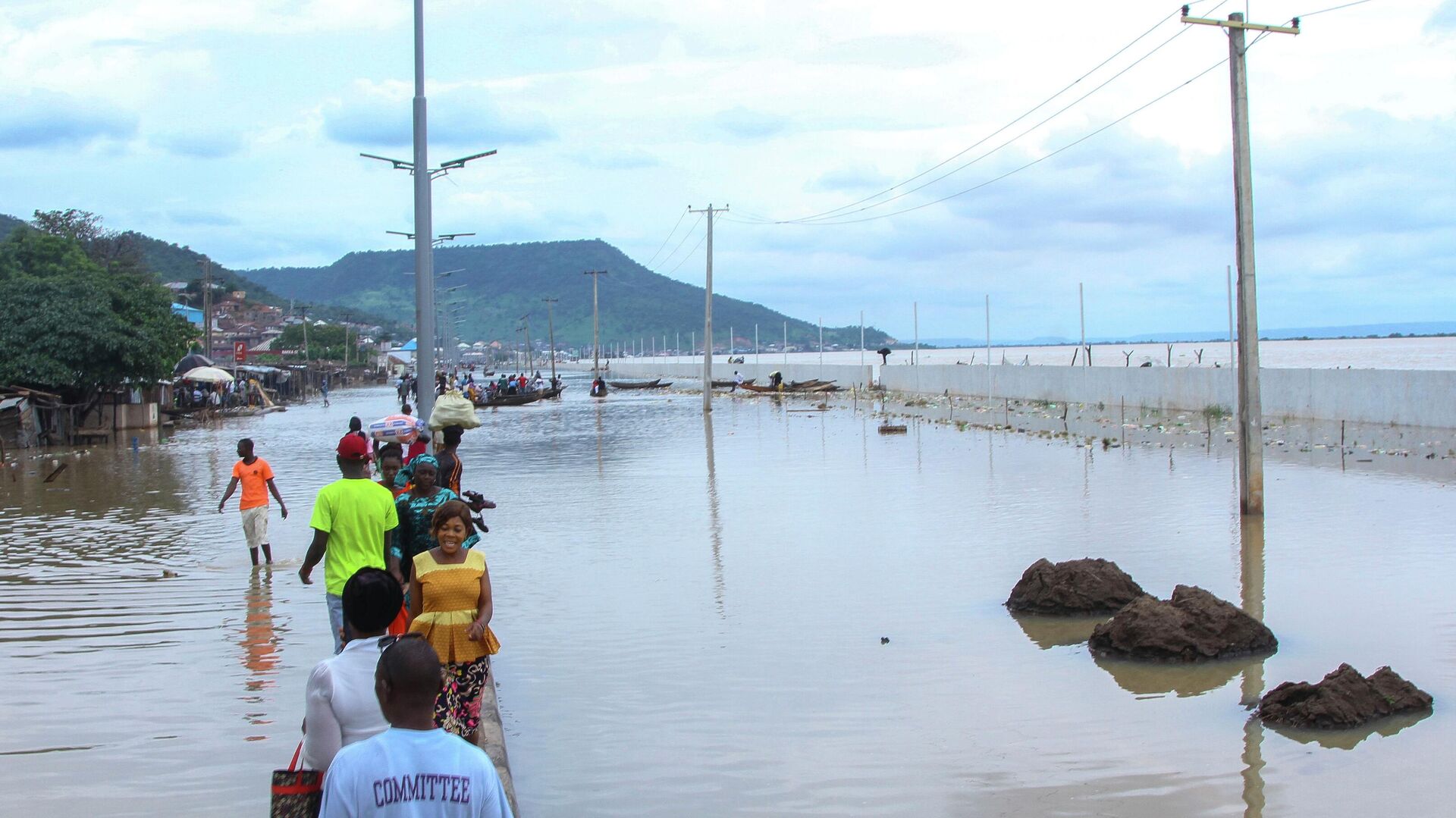https://sputnikglobe.com/20221013/over-500-dead-more-than-a-million-displaced-as-result-of-severe-floods-in-nigeria-1101796711.html
Over 500 Dead, More Than a Million Displaced as Result of Severe Floods in Nigeria
Over 500 Dead, More Than a Million Displaced as Result of Severe Floods in Nigeria
Sputnik International
Most of the states in the West African country of Nigeria have been affected by severe flooding this year. Authorities have approved National Emergency Flood... 13.10.2022, Sputnik International
2022-10-13T11:54+0000
2022-10-13T11:54+0000
2022-11-23T11:36+0000
africa
nigeria
floods
fatality
death
river
climate change
dam
west africa
https://cdn1.img.sputnikglobe.com/img/07e6/0a/0d/1101801728_0:233:3227:2048_1920x0_80_0_0_a7371bf37b8fc27a6014fc1339185689.jpg
Nigerian authorities stated that the number of deaths due to the floods hitting the country in recent weeks now exceeds 500.Around 1500 were reportedly injured, while some 90,000 homes have been partly or fully destroyed.He elaborated that the total number of partially and totally damaged houses was 44,099 and 45,249 respectively, while 76,168 and 70,566 hectares of farmlands have been partially or completely destroyed.All in all, 31 out of 36 states in the country, including the capital city Abuja suffered from flooding this year.A representative of the Nigerian Meteorological Agency argued that there’s a risk the country might experience even more floods in the coming days, according to an Africa News report.As for the countermeasures, Sani-Gwarzo stated that the National Emergency Management Agency came up with relief materials for at least 315,000 people in order to displace them from the line of the flooding impact.Nigeria is now experiencing one of the most devastating floods in recent history. Poor management of natural disasters and sporadic building are reportedly among the main reasons for the floods, while the government argues that heavy rains, overflowing rivers and the release of excessive amounts of water from dams throughout Nigeria are the culprits.Some experts also say that extreme weather, the sea level rise and other climate change impacts are guilty in the catastrophe. Despite the fact that floods are no news for the country, which is experiencing them annually, this year’s case has provoked fears of food shortages in the African country, as unprecedented amount of hectares of farmlands are under water.
https://sputnikglobe.com/20221003/dr-congo-hosts-african-climate-summit-ahead-of-cop27-1101457483.html
africa
nigeria
west africa
Sputnik International
feedback@sputniknews.com
+74956456601
MIA „Rossiya Segodnya“
2022
News
en_EN
Sputnik International
feedback@sputniknews.com
+74956456601
MIA „Rossiya Segodnya“
Sputnik International
feedback@sputniknews.com
+74956456601
MIA „Rossiya Segodnya“
nigeria, floods, fatality, death, river, climate change, dam, west africa
nigeria, floods, fatality, death, river, climate change, dam, west africa
Over 500 Dead, More Than a Million Displaced as Result of Severe Floods in Nigeria
11:54 GMT 13.10.2022 (Updated: 11:36 GMT 23.11.2022) Most of the states in the West African country of Nigeria have been affected by severe flooding this year. Authorities have approved National Emergency Flood Preparedness and Response Plans to mitigate the impacts of the floods nationwide.
Nigerian authorities stated that the number of deaths due to the
floods hitting the country in recent weeks now exceeds 500.
Around 1500 were reportedly injured, while some 90,000 homes have been partly or fully destroyed.
“It is on record that over 1.4 million persons were displaced, with about 500 persons reported dead, 790,254 persons moved out of their locations, while 1,546 persons were injured,” stated the Permanent Secretary of the Federal Ministry of Humanitarian Affairs, Disaster Management and Social Development, Nasir Sani-Gwarzo, speaking at a news conference on Tuesday, as cited by the local media.
He elaborated that the total number of partially and totally damaged houses was 44,099 and 45,249 respectively, while 76,168 and 70,566 hectares of farmlands have been partially or completely destroyed.
All in all, 31 out of 36 states in the country, including the capital city Abuja suffered from flooding this year.
A representative of the Nigerian Meteorological Agency argued that there’s a risk the country might experience even more floods in the coming days, according to an Africa News
report.
“...From the information, we’re getting from NIHSA we’re going to see more floods. And now the rain is concentrating on the North Central and the southern states. So that will be a combination of short duration, high-intensity rain," the agency's director-general Prof. Mansur Bako Matazu said during the opening ceremony of the workshop on the hydro-meteorological status and outlook system.
As for the countermeasures, Sani-Gwarzo stated that the National Emergency Management Agency came up with relief materials for at least 315,000 people in order to displace them from the line of the flooding impact.
“The National Emergency Flood Preparedness and Response Plans for Nigeria have just been approved by the Federal Executive Council and it contains all the details of the roadmap that needs to be done," he said. “We are taking all the necessary actions to bring relief to the people affected by the flood. All the concerned agencies have renewed their commitment to strengthen their efforts in reaching out to the victims and bring relief to them."
Nigeria is now experiencing one of the most devastating floods in recent history.
Poor management of natural disasters and sporadic building are reportedly among the main reasons for the floods, while the government argues that heavy rains, overflowing rivers and the release of excessive amounts of water from dams throughout Nigeria are the culprits.
Some experts also say that extreme weather, the sea level rise and other
climate change impacts are guilty in the catastrophe.
Despite the fact that floods are no news for the country, which is experiencing them annually, this year’s case has provoked fears of food shortages in the African country, as unprecedented amount of hectares of farmlands are under water.

3 October 2022, 13:20 GMT



